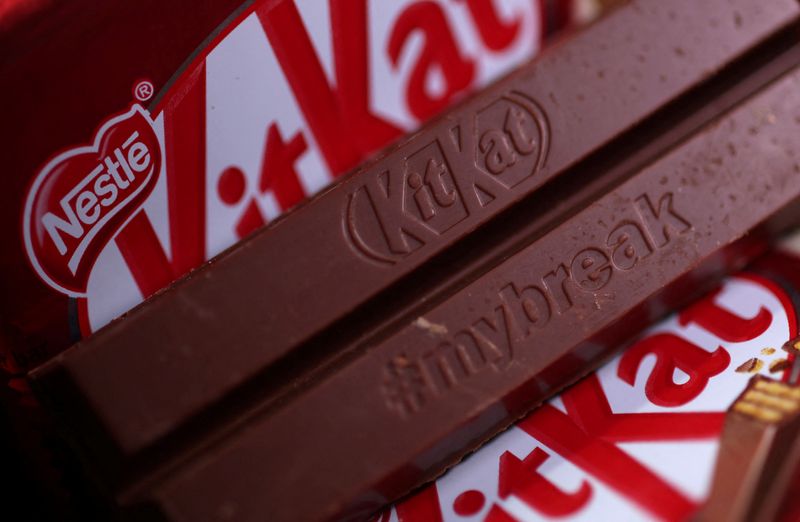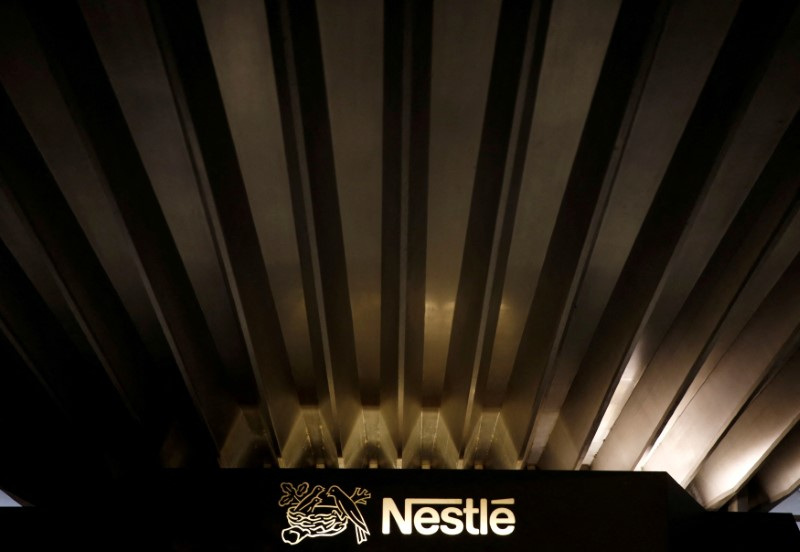By Agata Rybska and Yadarisa Shabong
(Reuters) -Nestle and Unilever (LON:ULVR) may be raising prices more slowly but it has not been enough to win back some cost-conscious customers.
The consumer goods giants both reported first-half sales growth which was below market expectations on Thursday.
Shares of Dove soap maker Unilever rose 6.2% as it nonetheless maintained its annual sales forecast and posted a first half profit beat, but Kit-Kat maker Nestle fell 5.5% after it lowered its sales outlook.
Unilever's stock hit its highest level since November 2020.
After nearly three years of rapid price hikes and a protracted global cost of living crisis, consumer goods makers have been trying to draw back shoppers who traded down to cheaper, often private label products.
"There is value-seeking behaviour among consumers. There is pressure, especially at the low-income range," Nestle CEO Mark Schneider said on a call with journalists.
Unilever identified Europe and the United States as regions where it was seeing more promotional activity.
The company's finance chief told journalists: "We believe that pricing in the next couple of quarters will remain relatively subdued."
Reckitt Benckiser (LON:RKT), which reported results on Wednesday, also missed sales growth expectations as lower volumes offset higher prices. Its shares were down 2.8% on Thursday.
The consumer goods industry has been struggling with soaring costs, with everything from sunflower oil and shipping to packaging, grain and energy becoming more expensive during and in the wake of the pandemic and Russia's invasion of Ukraine.
Nestle, the world's biggest packaged food company, lowered its organic sales outlook to at least 3% from about 4% previously, saying it had to slow the pace of price hikes earlier than it would have liked as consumers became increasingly cost-conscious.
The Swiss company's first-half sales increased 2.1%, compared to the average estimate of 2.5% in a company-provided consensus.
Both Nestle and Unilever beat market expectations for first-half sales volumes and profit margins, however.
"Unilever's ability to defend and expand margin, especially in this volatile input cost environment, speaks to the strength of the portfolio and management execution," said Jack Martin, an investment manager at Oberon Investments, which holds a small Unilever stake.
"Contrasted to Nestle, which has fallen victim to volatile input costs and has experienced customers downtrading amid economic pressure on the consumer," he added.
BRAND STRENGTH
Nestle's pricing miss is likely to make investors worry about 2025 margins and raises questions about brand strength, both for the company and the broader sector, Jefferies analyst David Hayes said in a note to clients.
Unilever forecast stronger-than-expected margins for the year but still expects margin expansion to be smaller in the second half.
"The only fly in the ointment that we can see is that competitiveness remains underwhelming," RBC Capital Markets analyst James Edwardes Jones wrote in a note after Unilever's results.
Both Unilever and Nestle are stepping up investment in their brands but while Nestle is looking to increase new product launches, Unilever is sticking to its plan to do "fewer things, better", focusing on its most popular lines.
Unilever CEO Hein Schumacher's first year at the helm has seen plans to spin off its ice cream business, lay off as many as 7,500 staff, and focus on 30 key brands as he tries to reverse years of underperformance.
Schumacher's predecessor had been criticised for allowing the group's brands to grow to about 400, distracting management from the best performers.
Nestle said its approach to product launches was not just about quantity but about precision and focus, adding that it was clear on what it can scale and which brands to build up.

Reckitt on Wednesday also announced plans to explore options for its troubled nutrition business and offload a portfolio of homecare brands by the end of 2025.
($1 = 0.8828 Swiss francs)
